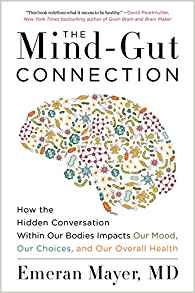 This book is subtitled “How the hidden conversation within our bodies impacts our mood, our choices and our overall health”, and it’s a 2016 book making it relatively up to date.
This book is subtitled “How the hidden conversation within our bodies impacts our mood, our choices and our overall health”, and it’s a 2016 book making it relatively up to date.
So, at some stage we’ve all experienced “gut instinct”, or butterflies in our tummy – probably we don’t give this a second thought, but what is the link between belly and brain? This book sets out to explore that.
We learn that the gut has its own nervous system which is more or less self sufficient in terms of running the processes of digesting and eliminating food – this isn’t particularly radical, and anyone who has studied the nervous system at even a cursory level will be aware of this, but to some people it will be new. What’s interesting is that although self sufficient this system, the Enteric Nervous System, also connects with the main Central Nervous System both sending to (afferent) and receiving from (efferent) the brain – which creates a feed back loop. Information about the state of our digestion – the foods we’ve got in is, the nutrients we’ve received, inflammation, stress, the digestive process – is sent to the brain, and helps tell our brain about our environment; brain information comes the other way – whether to prioritise digestion or hold it back to conserve energy, stress and emotion states, elsewhere in the body, danger. This can be a supportive relationship – a virtuous circle – or a unsupportive one – a vicious circle – depending on the general environment.
At the same time the host of microbes in our digestive tract- whose main role is digesting food, fighting toxins and housekeeping in the guts – also communicate with Enteric Nervous System relaying information about the inside of tract. But again these microbes also exist and thrive independently – and this is something about which we know a lot less and is an area where research is still helping us to understand the microbes relationship with themselves, the ENS and other systems in the body, e.g. the immune system. What we do know first is that the diversity and quality of the microbes correlates with our health overall, probably two way, the so called “gut-microbiome axis”. Many physical and mental health conditions are mirrored in the microbes.
And then there are neurotransmitters, normally found in the brain, also found in the digestive tract.
In all a complicated relationship, and one that is driven by more than simply nutrition – nurture and environment play a part, as does our own life outlook – a positive mind correlates with healthy digestion.
This isn’t a how to manual, e.g. “eat your way to happiness” or “positive thinking to cure IBS”, and neither is it a dry reference work. The author sets out to explain the systems, how they link together, what we know, what we can speculate, and how tentatively we can make positive choices for our lifestyle, mind and digestive system to support each other.
This is a book for anyone interested in physiology, or anyone with a slightly cranky digestive system. It’s a readable and useful work, which I recommend to others; having had IBS for some years, it was a useful recap for me, developing themes I already knew of, and giving me some thoughts on other areas.
You can buy the book on Amazon, and Yinspire earns a small commission if you use this link. http://amzn.to/2zVnu0f
